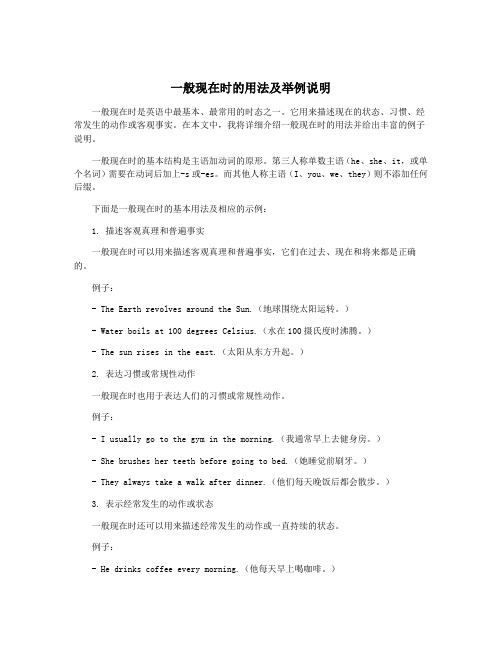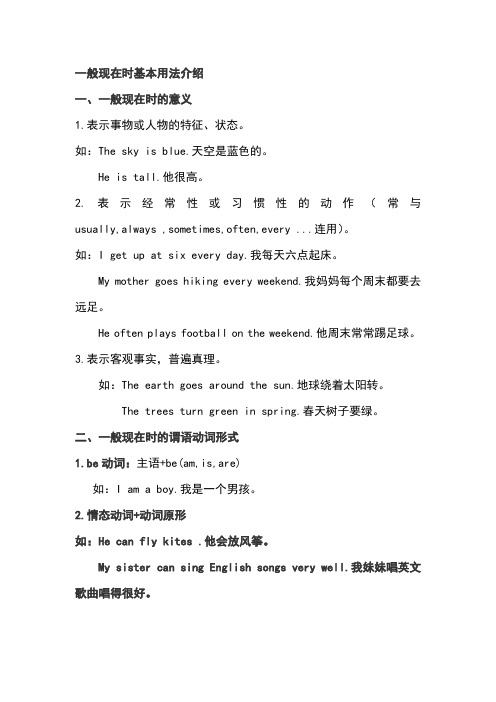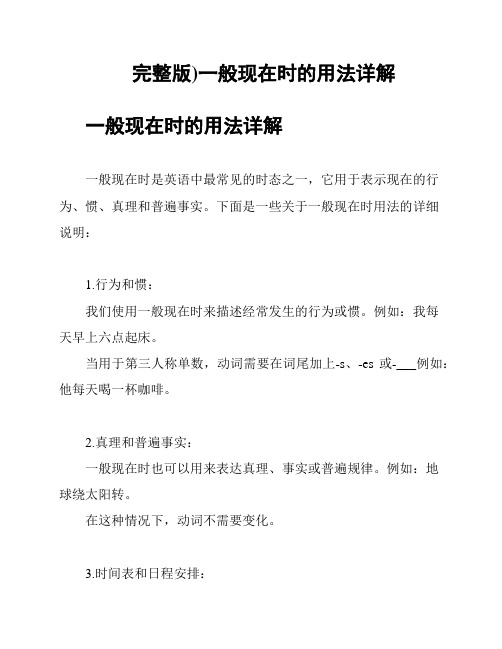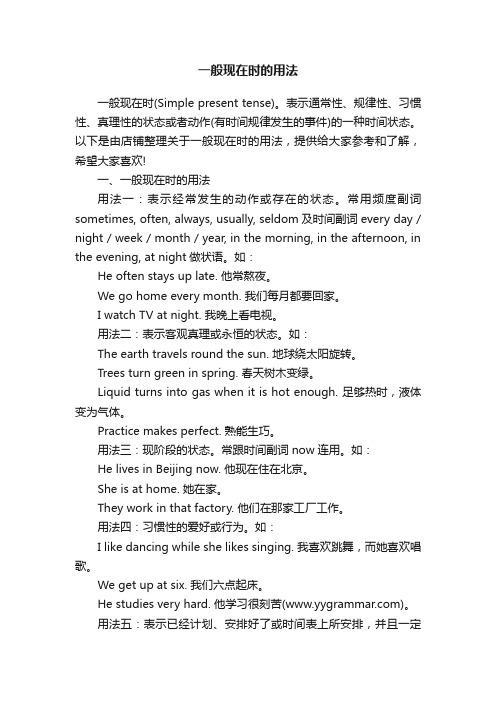一般现在时用法讲解
一般现在时的结构和用法讲解

一般现在时是英语中最常用的时态之一,用于描述现在正在进行的动作或经常发生的动作。
它的结构和用法如下:
1. 结构:主语+ 动词原形(第三人称单数需加-s/-es)+ 其他
例如:
- I eat breakfast every day.(我每天吃早餐。
)
- She works at a bank.(她在一家银行工作。
)
- They play soccer on the weekends.(他们周末踢足球。
)
2. 用法:
-描述现在正在进行的动作:例如,“I am reading a book.”(我正在看书。
)
-描述经常发生的动作:例如,“She always drinks coffee in the morning.”(她每天早上都喝咖啡。
)
-描述客观事实或普遍真理:例如,“The Earth revolves around the sun.”(地球绕着太阳转。
)-表示预测、安排或建议:例如,“It usually rains in the afternoon.”(下午通常会下雨。
)
-表示习惯或惯例:例如,“They have dinner at their parents' house every Sunday.”(他们每个星期天都在父母家里吃晚餐。
)
需要注意的是,一般现在时的动词形式取决于主语的人称和数。
第三人称单数的动词要加-s/-es 或-es 结尾,例如:plays, works, studies 等。
而其他人称的动词则不需要加-s/-es 或-es 结尾,例如:play, work, study 等。
一般现在时的用法及举例说明

一般现在时的用法及举例说明一般现在时是英语中最基本、最常用的时态之一。
它用来描述现在的状态、习惯、经常发生的动作或客观事实。
在本文中,我将详细介绍一般现在时的用法并给出丰富的例子说明。
一般现在时的基本结构是主语加动词的原形。
第三人称单数主语(he、she、it,或单个名词)需要在动词后加上-s或-es。
而其他人称主语(I、you、we、they)则不添加任何后缀。
下面是一般现在时的基本用法及相应的示例:1. 描述客观真理和普遍事实一般现在时可以用来描述客观真理和普遍事实,它们在过去、现在和将来都是正确的。
例子:- The Earth revolves around the Sun.(地球围绕太阳运转。
)- Water boils at 100 degrees Celsius.(水在100摄氏度时沸腾。
)- The sun rises in the east.(太阳从东方升起。
)2. 表达习惯或常规性动作一般现在时也用于表达人们的习惯或常规性动作。
例子:- I usually go to the gym in the morning.(我通常早上去健身房。
)- She brushes her teeth before going to bed.(她睡觉前刷牙。
)- They always take a walk after dinner.(他们每天晚饭后都会散步。
)3. 表示经常发生的动作或状态一般现在时还可以用来描述经常发生的动作或一直持续的状态。
例子:- He drinks coffee every morning.(他每天早上喝咖啡。
)- They play tennis every weekend.(他们每个周末打网球。
)- The cat sits on the windowsill.(猫坐在窗台上。
)4. 表达现在时刻正在发生的动作一般现在时也可以用来描述现在时刻正在发生的动作。
例子:- I am writing an essay right now.(我现在正在写一篇文章。
一般现在时态讲解

一般现在时态讲解公司内部档案编码:[OPPTR-OPPT28-OPPTL98-OPPNN08]一般现在时态讲解一般现在时(de)用法:1.表示经常性、习惯性(de)动作或存在(de)状态.eg. I go to school on foot. He is very busy now.2.表示主语(de)特征、性格、能力、爱好等.eg. He can swim. I work hard. I like watching TV.3.表示客观真理 eg. There are seven days in a week. 否定句:主语+be+not+其他 eg. Danny is not a good student. 一般疑问句:Be+主语+其他 eg. Is Danny a good student(2)句中有实意动词,如work, go, get, help, study, play 等表示主语(de)动作肯定句:主语+谓语动词+其他 eg. I work hard at school.否定句:主语+don’t 或doesn ’t+谓语动词原形+其他 eg. I don’t work hard at school.疑问句:Do 或Does + 主语+ 动词原形+其他 eg. Do I work hard at school . They have lunch at 12:00.They don’t have lunch at 12:00. Do they have lunch at 12:00注意:单数第三人称做主语时,谓语动词要用单三形式,变否定句须在动词前加助动词doesn’t;变一般疑问句须在句首加助动词does.. Jenny speaks English very well.Jenny doesn’t speak English very well. Does Jenny speak English very well动词第三人称单数(de)变化规则如下: (1)直接在动词词尾加-s.ask---asks work---works get---gets stay---stays play — plays like — likes(2)以字母s, x, ch, sh 或o 结尾(de)动词,在词尾直接加-es.watch---watches wish---wishes fix---fixesdo---does go---goes pass---passes(3)以“辅音字母加 - y”结尾(de)动词,要先变y 为i 再加-es. try---tries study---studies cry---cries fly---flies (4)不规则变化: have----has一般现在时态(de)时间状语为often、 usually、 always、 sometimes等频率副词,on Saturdays、 in the morning(afternoon evening) 、every day 等.常见错误:be动词与实意动词同时出现在句子中例:We are plant (plant) the trees in spring.(误)正解:We plant (plant) the trees in spring.解析:在英语中,be是表状态,do是表动作,两种动词不能同时出现在句子中,可记住如下口诀:“英汉语言有差异,be 、do不能放一起,仔细琢磨细分析,语法千万要牢记.”一般现在时态练习一般现在时态(de)时间状语为often、 usually、 always、 sometimes,on Saturdays、 in the morning/afternoon/ evening 、every day、every week 等.I.用所给词(de)正确形式填空1. We often___________(play) on the playground.2. He _________(get) up at six o’clock everyday.3. __________you _________(brush) your teeth every morning4. What____ (do) he usually _____(do) after school5. Danny _______(study) English, Chinese, Math, Science and Art atschool.6. Mike sometimes __________(go) to the park with his sister.7. At eight at night, she ________(watch) TV with his parents. 8. ________ Mike________(read) English every day9. How many lessons ______your classmate_______(have) on Monday10. What time _______his mother_________(do) the housework11. He often ______(have) dinner at home.12. Daniel and Tommy________ (be) in Class One.13. We___________________ (not watch) TV on Monday.14. Nick _____________________(not go) to the zoo on Sunday.15. They___________ (like) the World Cup16. What ______they often __________(do) on Sat urdays17. Your parents___________ (read) newspapers every day.18. The girl___________ (teach) us English on Sundays.19. She and I _____________(take) a walk together every evening.20.There____________(be) somewaterin the bottle.21. Mike _____________(like) cooking.22.They____________(have) the same hobby.23. My aunt_____________ (look) after her baby carefully.24. Youalways__________(do) yourhomeworkwell.25. I___________ (be) ill. I’m staying in bed.26.She_________(go) to school from Monday toFriday.27. Liu Tao _________(do) not like PE.28. Thechildoften___________ (watch) TV in the evening.29. Su Hai andSuYang _________(have) eight lessons thisterm.30. -What day _________(be) it today -It’s Saturday.31. Don’t make a noise. Grandpa __________________(sleep).32. Tom’s family__________(watch) TV.33. ---What ______ your mother _______(do) every evening---She _______(wash) clothes.34. _______ it______(rain)every day35. --What _______ you _______(do) on Sundays --We ________ (play) football.36. There ________ (be) a football match on TV every morning.37. They often ________ (visit) the Gre at Wall.38. He _____________ (not come).39. The earth __________ (move) round the sun.40.Mr. Wang often______( go) to Shanghai.Π. 以My School Life为题写一篇小短文,不少于60词.__________________________________________________________________ __________________________________________________________________ __________________________________________________________________ __________________________________________________________________ __________________________________________________________________ __________________________________________________________________ __________________________________________________________________ __________________________________________________________________ __________________________________________________________________ ______________________________________________________。
(完整版)一般现在时基本用法介绍

一般现在时基本用法介绍一、一般现在时的意义1.表示事物或人物的特征、状态。
如:The sky is blue.天空是蓝色的。
He is tall.他很高。
2.表示经常性或习惯性的动作(常与usually,always ,sometimes,often,every ...连用)。
如:I get up at six every day.我每天六点起床。
My mother goes hiking every weekend.我妈妈每个周末都要去远足。
He often plays football on the weekend.他周末常常踢足球。
3.表示客观事实,普遍真理。
如:The earth goes around the sun.地球绕着太阳转。
The trees turn green in spring.春天树子要绿。
二、一般现在时的谓语动词形式1.be动词:主语+be(am,is,are)如:I am a boy.我是一个男孩。
2.情态动词+动词原形如:He can fly kites .他会放风筝。
My sister can sing English songs very well.我妹妹唱英文歌曲唱得很好。
3.实义动词(又称行为动词):在一般现在时中,实义动词作谓语动词有两种形式:动词原形和动词的单数第三人称形式(1)动词原形:当主语不是单数第三人称时,谓语动词用原形。
如:We study English.我们学习英语。
I like singing.我喜欢唱歌。
(2)当主语是单数第三人称(he,she ,it以及可以用he, she ,it 代替的名词、名词短语,如Amy,Zhang Peng,my sister,John’s pen pal等)时,谓语动词要使用单数第三人称形式(简称“单三式”或“单三现”。
如:He likes dancing.他喜欢跳舞。
My sister usually goes shopping on the weekend.我妹妹周末常常去购物。
完整版)一般现在时的用法详解

完整版)一般现在时的用法详解一般现在时的用法详解
一般现在时是英语中最常见的时态之一,它用于表示现在的行为、惯、真理和普遍事实。
下面是一些关于一般现在时用法的详细
说明:
1.行为和惯:
我们使用一般现在时来描述经常发生的行为或惯。
例如:我每
天早上六点起床。
当用于第三人称单数,动词需要在词尾加上-s、-es或-___例如:他每天喝一杯咖啡。
2.真理和普遍事实:
一般现在时也可以用来表达真理、事实或普遍规律。
例如:地
球绕太阳转。
在这种情况下,动词不需要变化。
3.时间表和日程安排:
一般现在时也常用于描述时间表、日程安排和固定的安排。
例如:会议在下周三下午三点开始。
在这种情况下,一般现在时表示将来发生的动作。
4.感觉和喜好:
一般现在时也可用于描述感觉、喜好和态度。
例如:我喜欢吃巧克力。
在这种情况下,动词不需要变化。
需要注意的是,一般现在时并不仅限于表示现在发生的事情,还可以包括过去和将来。
它主要用于描述既定的事实和经常性的行为。
因此,在使用一般现在时时,不需要引用不能被确认的内容。
以上是一般现在时用法的简要说明。
希望对您有所帮助!。
一般现在时的用法

一般现在时的用法一般现在时(Simple present tense)。
表示通常性、规律性、习惯性、真理性的状态或者动作(有时间规律发生的事件)的一种时间状态。
以下是由店铺整理关于一般现在时的用法,提供给大家参考和了解,希望大家喜欢!一、一般现在时的用法用法一:表示经常发生的动作或存在的状态。
常用频度副词sometimes, often, always, usually, seldom及时间副词every day / night / week / month / year, in the morning, in the afternoon, in the evening, at night做状语。
如:He often stays up late. 他常熬夜。
We go home every month. 我们每月都要回家。
I watch TV at night. 我晚上看电视。
用法二:表示客观真理或永恒的状态。
如:The earth travels round the sun. 地球绕太阳旋转。
Trees turn green in spring. 春天树木变绿。
Liquid turns into gas when it is hot enough. 足够热时,液体变为气体。
Practice makes perfect. 熟能生巧。
用法三:现阶段的状态。
常跟时间副词now连用。
如:He lives in Beijing now. 他现在住在北京。
She is at home. 她在家。
They work in that factory. 他们在那家工厂工作。
用法四:习惯性的爱好或行为。
如:I like dancing while she likes singing. 我喜欢跳舞,而她喜欢唱歌。
We get up at six. 我们六点起床。
He studies very hard. 他学习很刻苦()。
一般现在时的用法及常见动词
一般现在时的用法及常见动词一般现在时是英语中最基本的时态之一。
它用来描述经常发生的行为、习惯、常规的真实情况,以及普遍的规律、事实和感受。
在使用一般现在时时,需要注意一些动词的用法和特点。
一、肯定句结构一般现在时的肯定句结构为:主语+ 动词原形(第三人称单数加-s)+ 其他成分。
例如:- He plays basketball every weekend.(他每个周末打篮球。
)- They study English at school.(他们在学校学习英语。
)- We go to the gym twice a week.(我们每周去健身房两次。
)二、否定句结构一般现在时的否定句结构为:主语 + do / does not + 动词原形 + 其他成分。
例如:- She does not like coffee.(她不喜欢咖啡。
)- They do not play video games.(他们不玩电子游戏。
)- We do not go to the movies on weekdays.(我们平常不去看电影。
)三、疑问句结构一般现在时的疑问句结构为:Do / Does + 主语 + 动词原形 + 其他成分?例如:- Do you like to read books?(你喜欢看书吗?)- Does he watch TV every night?(他每晚都看电视吗?)- Do they live in that house?(他们住在那栋房子里吗?)四、第三人称单数的注意事项在一般现在时中,第三人称单数的动词要加上-s或-es。
有一些特殊情况需要注意:1. 以s, sh, ch, x, o结尾的动词,直接在词尾加上-es。
- She passes all her exams.(她通过了所有考试。
)- He teaches English at a university.(他在大学教英语。
)- The bird watches everything from the tree.(鸟从树上观察一切。
一般现在时的详细用法
一般现在时的详细用法一、定义与基本概念一般现在时(Simple Present Tense)是英语中最基本、最常用的时态之一,用于描述经常性、习惯性、真理、事实或现在存在的状态。
它不强调动作发生的时间,而是关注动作或状态的普遍性或经常性。
在讲述个人日常活动、自然规律、普遍真理等场景中广泛使用。
二、谓语动词形式1.第一人称和第二人称单数及复数:动词使用原形,如“I eat”, “Weeat”, “You eat”。
2.第三人称单数:动词需加-s或-es构成第三人称单数形式,如“He eats”,“She writes”, “It moves”。
o规则变化:一般在动词后加-s,如“works”, “plays”。
o不规则变化:需特殊记忆,如“go”变为“goes”,“do”变为“does”。
三、句式结构1.肯定句:主语 + 动词(原形/第三人称单数)+ 其他成分。
o示例:I study English every day.2.否定句:主语 + don't/doesn't + 动词原形 + 其他成分。
o示例:He doesn't like coffee.3.疑问句:Do/Does + 主语 + 动词原形 + 其他成分?o示例:Do you speak English? Does she work here?四、常用时间状语●频率副词:always, usually, often, sometimes, never, everyday/week/month/year等。
●一般性时间状语:in general, on Sundays, at present等。
●描述自然现象或科学真理时,通常不使用明确的时间状语。
五、特殊用法1.表示将来确定会发生的事情:在时间状语从句或条件状语从句中,主句使用一般将来时,从句则用一般现在时代替一般将来时。
o示例:If it rains tomorrow, we won't go to the park.2.描述心理感觉或状态:如“I see”, “I feel”等,表示当前的心理感受或状态。
一般现在时讲解
一般现在时讲解一般现在时:可用于陈述现在时间内发生或存在的事件、动作或情况。
1、用法:1) 表示经常性或习惯性的动作,常与表示频度的时间状语连用。
时间状语:often, always, usually, sometimes ,everymorning/night/evening/day/week ,twice aweek ,never.如:I read English every morning. 我每天早上读英语。
She sometimes goes shopping on Sundays. 她有时候星期天去购物。
2) 陈述客观真理,科学事实。
如:The earth moves around the sun. 地球绕着太阳转。
Shanghai lies in the east of China. 上海立于中国的东方。
3)用于现阶段内发生的情况。
如:My father works in a school.我的爸爸在学校工作。
4) 用于格言或警句中。
如:Pride goes before a fall. 骄者必败。
5)当谈论的是时间表、节目单或日程表上所安排好的事情的时候,通常用现在时表示将来的意义。
如:The concert begins at 7:30 and ends at 9:30.音乐会于7;30开始,9:30结束。
6) 一般现在时be动词情况: am,is,are也可以做一般现在时的助动词。
如:I am a student.我是一个学生。
2、构成:主语(第一、二人称和复数)+ 动词原形 + 宾语主语(第三人称单数)+ 动词词尾要加-S + 宾语3、动词变单三的规则:(1)一般在动词词尾直接加-S。
如:buy--buys;drive—drives;run--runs以o/s/x/sh/ch结尾的动词词尾加-es。
如:do—does;fix—fixes;watch--watches (2)(3)以“辅音字母+y”结尾的动词把y变成i,再加-es。
英语 一般现在时讲解
英语一般现在时讲解一般现在时:表示经常性或习惯性发生的动作,或存在的状态,即发生在现在,并且难以判断起止状态的动作或状态。
构成方式:动词be、have和行为动词用原形;主语为单数第三人称时,谓语动词也要相应地变成第三人称单数。
1、一般现在时的用法:当不带感情色彩地叙述现在发生的动作本身时,用一般现在时。
(1)用于叙述现阶段经常性或习惯性的动作,常与often, always, sometimes, every day, on Sundays等表示频度的时间状语连用。
例:I have breakfast at 7 every morning.我每天早晨7点吃早餐。
例:I go swimming on Sundays.每周日我都去游泳。
(2)表示现阶段存在的状态、特征或心理活动。
例: I like fruits.我喜欢水果。
(3)用于叙述客观事实或真理。
例:The Thames flows through London.泰晤士河穿过伦敦。
例:The sun rises in the east and sets in the west.太阳东升西落。
(4)表示主语具备的性格、能力和特征。
例:They speak English very well.他们英语说得很好。
例:This taxi driver knows the city of Beijing like the back of his hand.这位出租司机对北京城了如指掌。
(5)表示计划安排好的将来动作,也可用一般现在时,但只限于:go, come, leave, start, begin, arrive, be等动词。
例:The plane takes off at 11 a.m.飞机上午11点起飞。
例:We leave Beijing next month.我们下月离开北京。
例:He comes back tonight.他今晚回来。
(6)在时间、条件状语从句中,用一般现在时代替一般将来时。
- 1、下载文档前请自行甄别文档内容的完整性,平台不提供额外的编辑、内容补充、找答案等附加服务。
- 2、"仅部分预览"的文档,不可在线预览部分如存在完整性等问题,可反馈申请退款(可完整预览的文档不适用该条件!)。
- 3、如文档侵犯您的权益,请联系客服反馈,我们会尽快为您处理(人工客服工作时间:9:00-18:30)。
3. 一般疑问句 (1)Am / Is / Are +主语 +表语 ? 如:Is your mother a teacher?你妈妈是老师吗?
Are you from China. 你来自中国吗? (2)a. Do + 主语 +动词原形 +其它 ? b. Does +单三人称主语+动词原形+其它 ? 如: Do you speak English? 你说英语吗?
the day after tomorrow, next
week , in two days’time ,from now on, in the future等。
We Play games Next week
practice
1.Ihope that you__ a good time this evening.
If I’m ill, __________________.
If I’m hungry, I will______________.
练一练:
1。如果她早点儿起床,就有时间在家里吃早餐 If she____ ____a little earlier, she’ll have time to eat breakfast at home. 2。如果你参加聚会,你将会过得很开心。 If you____ the party ,you_____ ____ a great time. 3。如果明天下雨,我们将不去野餐 If it ____tomorrow, we ___ ____ for a picnic. 4。如果你经常听英文歌,你将会喜欢英语 If you often ____ ___English songs, you___
什么是一般将来时态?
一般将来时表示将来பைடு நூலகம்一时刻发生, 或将经常发生的状态和动作。
一般将来时态的结构
be going to + 动词 原形 will + 动词原形
一般将来时表示将来某一时刻的 动作,状态以及打算。该时态一 般与表示将来意义的时间状语连 用。如:tomorrow, this month,
Where are you from ? 你来自哪里?
How old is she ? 她几岁了?
What do you do every day? 你天天做些什么?
What time does your mother get up every day?你妈 妈天天什么时候起床?
How often does Maria go to the library ? 玛利亚多久 去一次图书馆?
专项练习: ( B ) 1. Jenny ____ in an office. Her parents ____in
a hospital. A work, works B works, work C work , are working D is working , work
( B ) 2. Wang Mei ____ music and often ____ to music. A like; listen B likes; listens C like; are listening D liking ; listen
( B ) 3. Jenny____ English every evening. A has study B studies C study D studied
根据所给动词填空: 1. ___D_o_es___ your sister ___k_n_o_w___ (know) English? 2. Where ____d_o___ you___h_a_ve___ (have) lunch every day? 3. ____D_o_e_s__ she___d_o____(do) the housework every day? 4. Jenny and Danny usually____p_l_a_y___(play) games in the afternoon .
A. have B. are having C. will have
2.Look at those big black clouds. It __rain. Let’s hurry.
A. must B. will
C. is going to
3.There__ a basketball match this afternoon.
动词单三人称形式的构成:
1. 一般的动词词尾+S。2. 以sh/ch/s/x 结尾的词+es. 3. 以辅音字母Y结尾的把Y 变成 i,+es。4. 辅音字母 +o结尾的+es.)
2. 否定句 (1)主语 +am / is / are + not +表语
如:She is not a nurse. 她不是护士。 We are not in the same class, but we are in
___English.
(3 )表示主语具备的性格和能力等。如:She likes basketball games. 她喜欢篮球运动。He speaks English well. 他英语讲的好。
(4 )表示客观事实和真理。如: There are seven days in a week. 一周有七天。 The earth goes around the sun. 地球绕着太阳转。
(1 )表示现在的状态。如:My name is Michael. I am twelve. I am a student. I am in Class 4, Grade 7.
( 2 )表示经常或习惯性的动作。如:I get up at six every day. 我天天6点起床。 Classes begin at eight. 8点开始上课。
A. will have B. will be
C. have
4. We__ to the park if it is fine tomorrow.
A. will go B. go
C. to go
If 引导的条件状语从句
用法:
1. 如果主句是一般将来时,从句则用一般现在时。 If it rains(从句), I will stay at home. I’ll go with you if you don’t want to go alone(从句).
一般现在时用法讲解
一、 一般现在时用法歌诀
学习一般现在时, 基本用法要熟悉; 特征性格和能力, 客观事实与真理; 发生动作经常性, 存在状态和习惯; 以上歌诀念几遍, 把握还需多多练。
1. 定义:一般现在时表示包括现在在内的经常性、习惯 性的动作或状态,以及客观存在的普遍真理等。常与 often、 usually、 sometimes、 every day、always、 on sundays 等时间状语连用。
如果你想减肥,你必须少吃面包。
3. 如果主句是祈使句,从句同样要用一般现在 时。
Don’t go and play football if you don’t finish your homework.
Please call me if he comes next Sunday
Look and say
2.如果主句含有must, may, can 等情态动词,从句也要用 一般现在时。
If you drive too fast, you may have an accident. You must stop if the traffic is red. If you finish the homework, you can go home. 如果你作业做完了就可以回家了。 If you want to lose weight you must/should eat less bread.
Does your brother have a wide mouth ? 你弟 弟有一个大嘴巴吗?
(do does 用法歌诀: do、does构成疑问句、否 定句,I、 you 、we 、they 用 do ,he、 she 、 it 用does ,动词一律用原形。)
4. 特殊疑问句
特殊疑问词 +一般疑问句 ?
the same grade. 我们不在同一个班,但在同一个 年级。
(2)a. 主语 +don’t +动词原形 +其它 b. 单三 人称主语+doesn’t +动词原形+其它 如:I don’t play soccer after school. 我放学后不 踢足球。
Wang Junfeng doesn’t go to the park after school. 王军峰放学后不去公园。
二、 一般现在时的构成
1. 肯定句
(1)主语+ am / is / are +表语 如:They are new students. 他们是新生。 I am tall. 我个子高。 He is from Japan. 他来自日本。
( am is are 用法歌诀 I用am ,you 用are ,is 连着他、她、它;单数用 is , 复数一律都用are。) (2)a. 主语+ 实义动词+ 其它 b.单三人称主语+实义动词单三人称+其它 如: I read English every morning. 我天天早晨读英语。 He usually goes to school by bike. 他通常骑自行车去上学。 Maria often does her homework after school. 玛利亚经常放学后做作业。 Jane’s mother works in a hospital. 简的妈妈在医院工作。 (用法歌诀: I 、you、 we 、they 动词用原形;he 、she、 it 动词用单三人 称)
